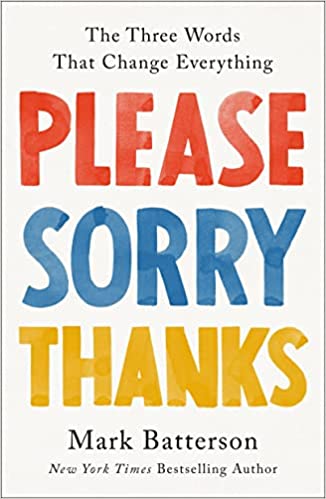
The more I considered Christianity, the more I found that while it had established a rule and order, the chief aim of that order was to give room for good things to run wild. — G.K. Chesterton, Orthodoxy
In 1942, an Austrian psychiatrist named Viktor Frankl was arrested by the Nazis. He would spend three years in four different concentration camps, including Auschwitz. Frankl was stripped of his possessions, his clothes, even his name. He was reduced to a number—prisoner 119,104. His mother and father, as well as his wife, would die in those concentration camps.
The year after his liberation, Viktor Frankl wrote a book titled Man’s Search for Meaning. A survey conducted for the Library of Congress ranked it as one of the thirteen most influential books in the United States. In that book, Frankl shared the secret to his survival. He said, “Everything can be taken from a man but one thing: the last of the human freedoms—to choose one’s attitude in any given set of circumstances.”
In psychology, mental health is measured on a spectrum from depression to flourishing. Flourishing is evidenced by optimism, empathy, and authenticity. It’s inner joy. It’s self-esteem. It’s a strong sense of purpose. On the other side of the spectrum is depression. It’s evidenced by hopelessness and helplessness. It’s feeling like the best is behind you.
Between depression and flourishing, there is languishing, “the neglected middle child of mental health.” It’s not mental illness, but it’s not mental wholeness. It’s apathy instead of empathy. It’s no-man’s-land. It’s feeling blah. It’s a lack of focus, lack of motivation, lack of vision.
The Causes of Languish
When it comes to languishing, there are lots of causes. Let me focus on two of them. One is loneliness, and the other is purposelessness. Remember when Elijah defeated the 450 prophets of Baal? You would think he would have been on cloud nine, but he found himself in a deep depression. In all fairness, he was receiving death threats from Queen Jezebel. So there’s that. When someone is trying to kill you, it tends to affect your mental health! But there is another factor that is easily overlooked: “He went on alone into the wilderness.”
Did you catch it? Not only was Elijah in the wilderness; he was also all alone! We have never been more connected, technologically speaking. And we’ve never been more disconnected. Why? Digital doesn’t do it. In fact, the distance created by digital devices can cause us to demonize one another. There, I said it.
“He who has a why to live for,” said Friedrich Nietzsche, “can bear almost any how.” In the same sense, we can bear almost any burden if we have the right people in our corner. After the Exodus, the Israelites found themselves fighting the Amalekites. Moses interceded for them, but his hands got heavy. That’s when Aaron and Hur held up his arms, and as long as they did, Israel prevailed.6 All of us need an Aaron and a Hur now and then, here and there. We need people who will lift us up when we’re feeling down.
I recently rode my first bike century. Along with 180 other riders, I biked a hundred miles in a little under six hours. I felt great the first fifty miles. The last fifty? I had some doubts about whether my training was sufficient. With seven miles to go, I hit a hill and my quads started cramping. I had fallen behind the pack when the race organizer, Jeff Zaugg, dropped back to join me. He did more than give me a pep talk; he let me draft behind him up the hill. Jeff is six feet seven, so that’s a pretty decent draft.
We all need to draft, don’t we? We need someone to bear our burdens. We need someone to spur us on. We need someone to pick us up when we’re ready to throw in the towel.
Take my life; I am no better than my ancestors.
That is some stinking thinking! Elijah threw a pity party, and the problem was purposelessness. “Where there is no vision, the people perish.” The word perish refers to fruit that is rotting. Vision is a preservative. It will keep you young! The best way to stop sinning isn’t to stop sinning. That’ll work for a week or two. You need a vision that is bigger and better than the temptation you face!
Finding Purpose
Carl Jung believed that seemingly insurmountable problems can’t be solved; they can only be outgrown! We have to discover something more important than the problem. In other words, we need a purpose that redeems our pain. When we find our purpose, the problem loses its power and goes away!
When the Israelites were enslaved by the Egyptians, their lives were made miserable by cruel taskmasters. They were so discouraged they couldn’t be encouraged. And it’s hard to blame them. When all you’ve ever known is slavery, it’s hard to imagine anything else. Despite the promise of deliverance, the Israelites were despondent.
They did not listen to Moses, because of their broken spirit.
One translation uses the phrase anguish of spirit. You could easily add an l—languish. That phrase in Hebrew is qotser ruach, and it can be translated a few ways. It can mean “diminished spirit” or “shortness of breath.” The Israelites were breathing shallow. Remember the sympathetic nervous system? The Israelites were constantly trying to catch their breath because of the backbreaking work. The phrase qotser ruach can also be translated “voicelessness.” Without breath, you can’t speak.
Are you languishing?
Or are you flourishing?
The tipping point, the turning point, is thanks! It’s the difference between positivity and negativity. Once again, it was ten negative people who kept the Israelites out of the Promised Land. It was ten negative people who cost the Israelites forty years in the wilderness! Positivity isn’t just a function of personality; it’s a function of theology.
As I see it, we live at the intersection of two theologies, two realities. The faithfulness of God is pursuing us from the past—so far, so God. “Surely goodness and mercy shall follow me all the days of my life.” And the sovereignty of God is setting us up for the future— the best is yet to come. We are God’s workmanship, created in Christ Jesus to do good works, which God has prepared in advance. Simply put, God’s got this. God’s got you.
What is the locus of your confidence? Is it your education? Your résumé? Your bank account? Or is it the promises of God? The character of God— His goodness, His faithfulness? Truth be told, my self- confidence is below average. But my holy confidence is off the charts. I’ve seen too many miracles to not believe God for the next one! Don’t tell me He can’t do it— and by it, I mean anything! Positivity is standing on the promises of God.
Doubt is letting your circumstances get between you and God. I’m certainly not suggesting that you ignore reality. You need to confront the brutal facts, but you need to do so with unwavering faith. Faith is putting God between you and your circumstances.
If you want to move from languishing to flourishing, there are no easy answers. And there are no quick fixes. But this I know for sure: You won’t get there without gratitude. You can’t control your circumstances, but you can control your response. Gratitude is the difference between bitter and better.

Photo Credit: ©GettyImages/dmbaker
LISTEN: Thinking Christian about Making and Keeping New Year's Resolutions
The views and opinions expressed in this podcast are those of the speakers and do not necessarily reflect the views or positions of Salem Web Network and Salem Media Group.
WATCH: 10 Sins Christians Downplay (and Why They're So Destructive)
Stock Footage & Music Courtesy of Soundstripe.com Thumbnail by Getty Images
READ: 10 Sins That Often Go Overlooked in Christian Community








